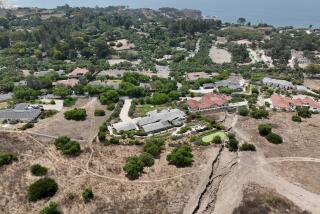After Temblors, Heat, Business Community Takes Outage in Stride
- Share via
Thousands of workers in downtown Los Angeles went on an unplanned--and jarring--journey Tuesday from the high-tech present to a pre-tech past, as their places of business struggled through a day in which electricity once again seemed a miracle.
In some cases, the struggle was a losing one. A fire at a city electrical station before 2 a.m. Tuesday caused a massive power failure that shut down banks, forced securities firms to conduct their affairs through offices outside the city and required many workers to toil in withering heat and partial darkness. Some began their workday by following flashlight beams out of pitch-black parking structures and ended it with a premature holiday.
Power was out in most of the downtown business district for eight hours, causing massive traffic jams just as most employees arrived for work. In a number of cases, traffic backed up onto surface streets because cars were moving very slowly to enter darkened parking garages.
“We’re beyond the point of humor,” said Kathryn McConville, store manager of the Bullock’s department store at Seventh Market Place, which opened an hour late at 11 a.m. as power was restored. “What else can happen to the downtown worker?”
In a week of trembling earth and scorching sun, man-made power--or the lack of it--provided an answer Tuesday. The outage swept through a six-square-mile section in the heart of downtown, yet in a most undemocratic manner.
Some Financial Concerns Lost Time
At Southern California Gas Co. headquarters at Eighth and Flower streets, part of the complex had elevators and lights, while part did not. Employees of Atlantic Richfield Plaza on 555 S. Flower St. were generally unaffected, though hundreds were stranded outside the Crocker Center on nearby Bunker Hill.
And for the many financially oriented businesses clustered downtown, invaluable hours were lost despite the general return of power by mid-morning. Robert A. White, a vice president at First Interstate Bancorp, discovered something awry when the gate to the bank’s parking garage stayed stubbornly shut when he arrived for work at 5:05 a.m. More importantly, most phones were out, forcing his employees to conduct critical currency exchange transactions through the bank’s London office.
Finally, he gave up and went home before lunch. “Our computer screens and communications were down, so we couldn’t be part of the marketplace,” White explained. “There was nothing we could do.”
At the securities firm of Jefferies & Co. at 445 S. Figueroa St., workers arriving just after 4 a.m. discovered a dark building. So they turned around “and called our other offices on our car phones,” recalled Executive Vice President Gordon McDonnell. Ultimately, their office phones returned to service, and the firm suffered virtually no losses in sales, he added.
For the most part, businesses declined to estimate their losses due to the outage, but they paid a price for the power failure--both in lost sales and added stress to employees who are coping with the recent earth tremors and wilting heat. “There’s no way I could put a number on it,” said Michael Bandick, a spokesman for Security Pacific National Bank, noting that some business might be made up. “(But) there’s some logical conclusions you can draw on what happens any time a business isn’t operating during the hours it’s normally operating.”
He added, that while the office computers were down, “there were a lot of people standing around with nothing to do.”
Los Angeles Diamond Co., which operates several stores in the jewelry district, lost extra time because it takes almost an hour to retrieve all the gems from the safes and place them on display, and that couldn’t be accomplished until the power returned at 11:15 a.m. Nonetheless, “One of the biggest complaints (from employees) was that you couldn’t get a cup of coffee because none of the coffee machines worked,” said Morton Bowman, the company’s president.
Wells Fargo Bank, with 550 employees in its Crocker Center offices, was without telephone service from 9 a.m. to noon, and its automatic teller machines didn’t work in the affected area. Yet employees stoically kept the downtown branch open. “Instead of being able to type the names in cashier’s checks they were writing them in--because the electric typewriters didn’t work,” said Wes Lockwood, a bank spokesman. He added that various expected problems didn’t come up--for the simple reason that most people assumed the bank was closed.
The lack of clientele also affected the exclusive Seventh Street Bistro, which reported a 10% decline in lunch customers, although the restaurant itself had no loss of power. “I came in this morning with flashlights,” said Louise Lewis, the restaurant’s controller. “I was prepared. But everything was fine.”
At Reuters Information Services, which provides business and financial news to financial institutions, corporations, newspapers and other clients, concerns focused on what was a precious commodity Tuesday--cool air, required for the communications equipment.
Ultimately, employees found a low-tech--but highly effective--means of replenishing it: They aimed fans at trays heaped with dry ice to combat the hot air. “None of our clients have lost service as a result of problems here,” said Michael Duff, manager of the company’s Western region, though he acknowledged that some local clients may have had problems because of their own lack of power.
Indeed, even on a workday in which society’s own infrastructure proved a mite shaky, the disruptions were anti-climactic compared to other recent events: “We just stuck through it, to be honest,” said Security Pacific’s Bandick. “After the earthquake, this is pretty easy stuff.”
More to Read
Inside the business of entertainment
The Wide Shot brings you news, analysis and insights on everything from streaming wars to production — and what it all means for the future.
You may occasionally receive promotional content from the Los Angeles Times.










